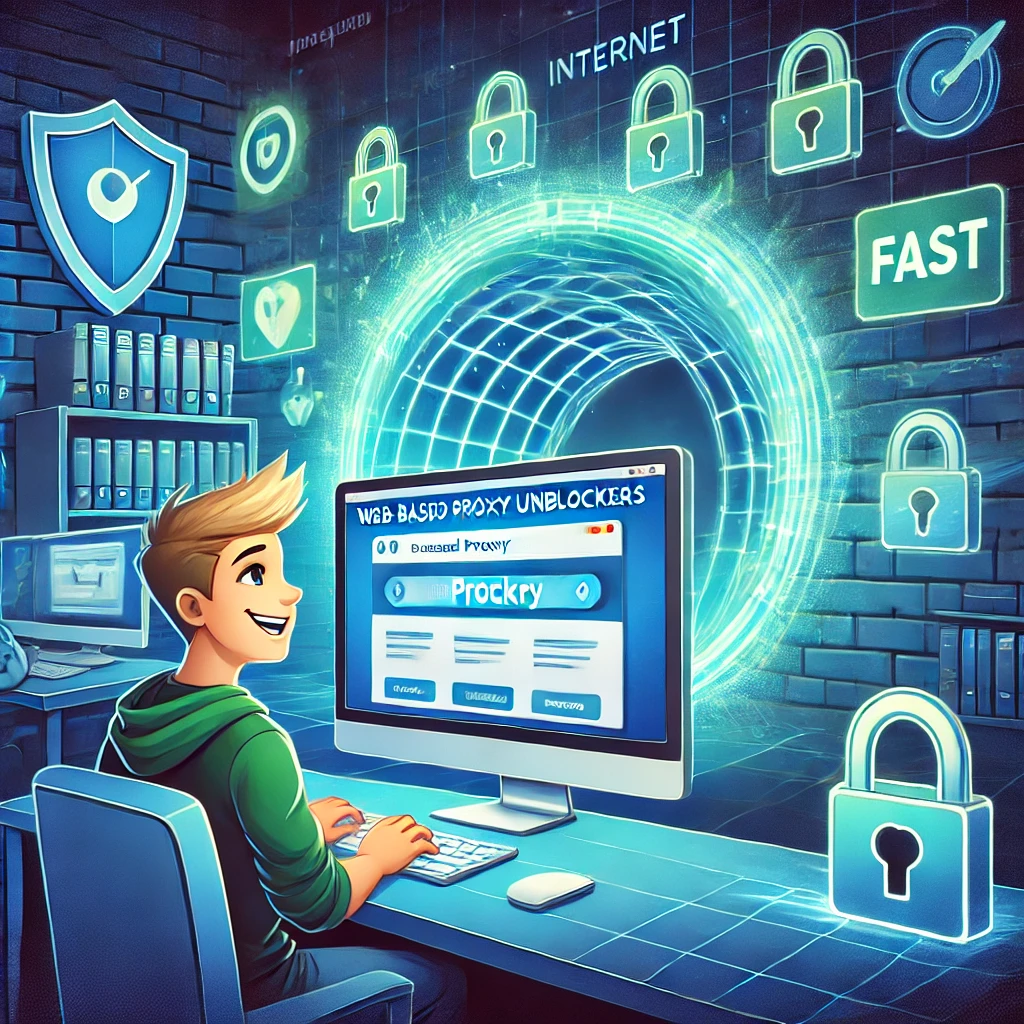When faced with school internet restrictions, many students struggle to find the most effective method to access educational resources that may be incorrectly blocked. With multiple unblocker options available, such as web proxies, VPNs, and browser extensions, choosing the right solution can be confusing. Each method has distinct advantages and limitations that make it suitable for different scenarios.
This guide will help you understand the key differences between these three main categories of unblockers, enabling you to make an informed decision based on your school’s specific restrictions, your device type, and your particular needs. We’ll focus on helping you access legitimate educational content while using these tools responsibly.
Understanding School Network Restrictions
Before selecting an unblocker method, it’s essential to understand how school networks restrict internet access.
Common Blocking Methods Used by Schools
Schools typically implement several approaches to limit internet access:
- Content filtering systems: Software that categorizes and blocks websites based on their content
- DNS blocking: Prevents connections to specific domain names by refusing to translate them to IP addresses
- Port restrictions: Blocks certain types of internet traffic
- Firewall rules: Controls which applications can access the network
- Device management policies: Restricts what can be installed or modified on school-owned devices
Identifying Your School’s Restriction Level
School networks vary significantly in their restriction severity:
- Basic filtering: Simple content filters that block obvious categories
- Moderate restrictions: More comprehensive blocking plus some application controls
- Advanced systems: Deep packet inspection, SSL decryption, and strict device management
The effectiveness of different unblocker methods depends heavily on your school’s restriction level. To determine this, try accessing various types of websites, attempting to install browser extensions, and checking if you can modify network settings on your device.
Web-Based Proxy Unblockers: The Basics
Web proxies are often the first solution students try when encountering blocked websites.
How Proxy Unblockers Work
A web proxy acts as an intermediary between your device and the websites you want to visit:
- You access the proxy website (which isn’t blocked)
- You enter the URL of the blocked site into the proxy
- The proxy retrieves the website content on your behalf
- The content is displayed within the proxy’s interface
Since the school’s filtering system only sees you connecting to the proxy site—not the ultimate destination—you can access otherwise blocked content.
Advantages of Proxy Unblockers
- No installation required: Works entirely through your browser
- Compatible with restricted devices: Functions on Chromebooks and other managed devices
- Simple to use: Enter a URL and start browsing
- Usually free: Most proxy services don’t require payment
- Disposable: If one gets blocked, you can easily find another
Limitations and Challenges
- Easily detected: Many schools actively block known proxy sites
- Limited functionality: Complex websites, videos, and interactive content often break
- Privacy concerns: Free proxies may track your browsing or display invasive ads
- Performance issues: Typically slower than direct connections
- Security risks: Unencrypted proxies can expose your data
VPN Unblockers: Complete Protection
Virtual Private Networks (VPNs) offer a more comprehensive solution for bypassing restrictions.
How VPN Unblockers Work
VPNs create an encrypted tunnel between your device and a server outside your school network:
- You install and connect to a VPN application
- All your internet traffic is encrypted and routed through the VPN server
- The school network can only see that you’re connected to the VPN, not what sites you’re visiting
- The encryption prevents content filtering from analyzing your traffic
Unlike proxies that work on a per-site basis, VPNs protect all internet traffic from your device.
Advantages of VPN Unblockers
- Complete encryption: Prevents content filtering and monitoring
- Higher success rate: More effective at bypassing sophisticated restrictions
- Better privacy protection: Hides browsing activity from network administrators
- More stable connections: Generally more reliable than proxies
- Full application support: Works with all internet-connected applications, not just websites
Limitations and Challenges
- Installation requirements: Needs software to be installed, which may be prevented on school devices
- Cost considerations: Quality VPNs typically require subscription payments
- Network-level blocking: Schools may block VPN protocols entirely
- Speed impact: Encryption and routing can slow down connections
- Technical complexity: More challenging to set up than web proxies
Browser Extensions: The Middle Ground
Browser extension unblockers combine some of the simplicity of proxies with added functionality.
How Extension Unblockers Work
These extensions integrate directly with your browser to provide proxy or VPN-like capabilities:
- You install the extension from a browser store
- The extension adds proxy/VPN functionality directly to your browser
- Traffic is routed through the extension’s servers, bypassing restrictions
- Some extensions offer additional features like ad blocking or script control
Advantages of Extension Unblockers
- Easier to use than VPNs: Simplified interface integrated with your browser
- More features than basic proxies: Additional privacy and security tools
- Convenience: One-click access to unblocking capabilities
- Better browser integration: Designed specifically for web browsing
- Site-specific controls: Can be enabled only for certain websites
Limitations and Challenges
- Installation restrictions: School-managed devices may prevent extension installation
- Browser-specific: Only works within the browser, not other applications
- Varying effectiveness: Quality and capabilities differ significantly between extensions
- Permission concerns: May require extensive browser permissions
- Privacy considerations: Free extensions might collect browsing data
Comprehensive Comparison: Making Your Choice
To help you decide which method is best for your situation, consider these key factors:
| Feature | Web Proxies | VPNs | Browser Extensions |
|---|---|---|---|
| Installation Required | No | Yes | Yes |
| Works on Restricted Devices | Yes | Sometimes | Sometimes |
| Ease of Use | Very Easy | Moderate | Easy |
| Effectiveness | Moderate | High | Moderate-High |
| Speed | Slow-Moderate | Moderate-Fast | Moderate |
| Privacy Protection | Low | High | Moderate |
| Cost | Usually Free | Often Paid | Mixed |
| Best For | Quick, occasional access | Complete protection | Regular browsing |
Decision Flowchart: Which Method Is Right for You?
Consider the following questions to determine your best option:
- Can you install software or extensions on your device?
- No: Web proxy is your only option
- Yes: Continue to question 2
- Do you need to unblock non-browser applications?
- Yes: VPN is your best choice
- No: Continue to question 3
- How important is speed and website compatibility?
- Very important: Consider a paid VPN
- Somewhat important: Browser extension
- Less critical: A Web proxy might suffice
- How concerned are you about privacy?
- Very concerned: Choose a reputable VPN
- Moderately concerned: Consider a privacy-focused browser extension
- Less concerned: Web proxy may be adequate
- What’s your budget?
- No budget: Free web proxy or free browser extension
- Some budget: Premium browser extension or budget VPN
- Larger budget: Premium VPN service
Setup and Implementation Guide
Here’s a brief overview of how to implement each method:
Setting Up a Web Proxy
- Find reliable proxy sites through educational forums or resource lists
- Bookmark working proxies for quick access
- If one proxy is blocked, try alternatives
- Clear your browsing history after using proxies
- Be cautious about entering sensitive information
Implementing a School-Friendly VPN
- Research VPNs that work well in school environments
- If installation is possible, download from the official website
- Choose server locations closer to you for better speed
- Use stealth or obfuscation features if available
- Consider mobile data as a backup if VPNs are completely blocked
Installing and Configuring Unblocker Extensions
- Access the Chrome Web Store or Firefox Add-ons site (if not blocked)
- Search for reputable unblocker extensions
- Review permissions before installing
- Configure for optimal privacy and performance
- For managed devices, look for alternative installation methods
Security and Privacy Considerations
When using any unblocker, keep these essential security factors in mind:
Data Collection Risks
- Free services often collect and sell browsing data
- Read privacy policies before using any service
- Consider what information the service can access
- Be especially cautious with free VPNs and proxies
Malware and Phishing Risks
- Stick to well-known, reputable services
- Be wary of unblockers with excessive ads
- Never download additional software when prompted
- Check reviews and research before using new services
Ethical and Responsible Usage
Using unblockers comes with ethical responsibilities:
When to Use Unblockers
- For accessing legitimate educational resources
- When researching topics where important sources are blocked
- When alternative approved resources aren’t sufficient
- By your school’s acceptable use policy, when possible
Best Practices for Safe Usage
- Focus on educational content rather than entertainment
- Don’t share unblocker methods widely at school
- Be discreet about your browsing activities
- Use these tools sparingly and responsibly
Frequently Asked Questions
Which unblocker method is fastest? Generally, paid VPNs offer the best speed, followed by quality browser extensions. Web proxies are typically the slowest option due to server limitations and the way they process web content.
Can school administrators detect these methods? Yes, to varying degrees. Advanced monitoring systems can detect patterns associated with proxies and virtual private networks (VPNs). However, quality VPNs with obfuscation features are more difficult to detect than basic web proxies.
Are free unblockers safe to use? Free unblockers vary greatly in safety. Many free proxies and VPNs support themselves by collecting and selling user data. Browser extensions from reputable companies tend to be safer than random proxy websites.
Which method works best on school Chromebooks? For managed Chromebooks where software installation is not possible, web proxies are often the only option. If you can install extensions, browser-based unblockers may work. VPNs are generally the most difficult to use on managed Chromebooks.
Is it better to use multiple methods together? While using various methods might seem like a good idea, it typically causes performance issues and may increase your chances of detection. It’s best to choose the most suitable single method for your specific situation.
Conclusion
Choosing between web proxies, VPNs, and browser extensions primarily depends on your specific circumstances, including your device’s limitations, your technical expertise, and your unique needs.
- Web proxies are best for quick, occasional access on highly restricted devices.
- VPNs provide the most comprehensive protection and compatibility, but require installation privileges.
- Browser extensions offer a middle ground, combining ease of use with better functionality than basic proxies.
Remember that the most sustainable approach is often to discuss access needs with teachers or IT administrators. Many schools are willing to adjust filtering for legitimate educational resources when requested through proper channels.


